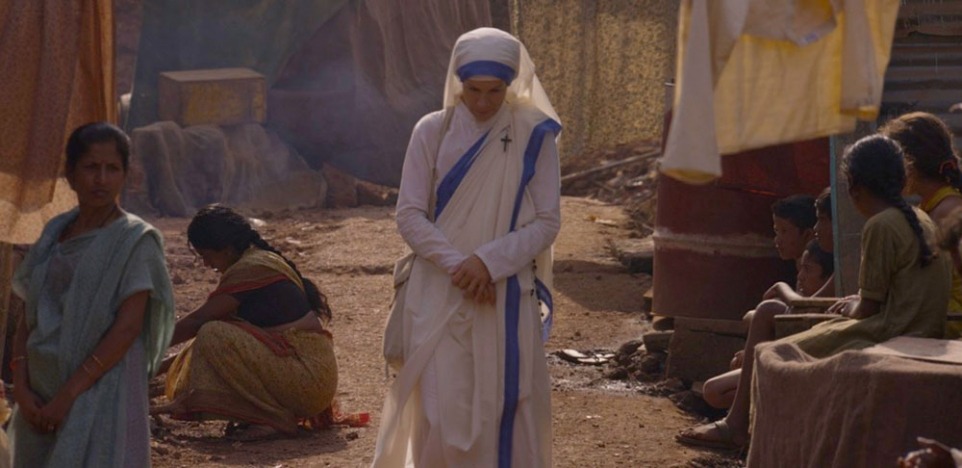"In this life we cannot do great things. We can only do small things with great love."
— Mother Teresa
Mother Teresa (1910-1997) had a passion for serving, in her own words, "the unwanted, the unloved, and the uncared for." In these times of widespread poverty and a growing gap between the rich and the poor, we look to her as the model of a new kind of saint. Although she had a fire in her heart for her mission, she also struggled, as many of us do, with feelings of isolation and loneliness. She made headlines with her ministry to the poorest of the poor but inwardly battled with a sense of being abandoned by God. Mother Teresa gave herself completely to others but, like us, she was not without flaws. That is the kind of saint we need to recognize.
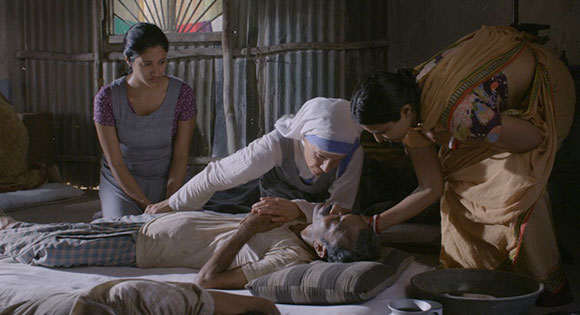
"If we have no peace, it is because we have forgotten that we belong to each other."
— Mother Teresa
The Letters offers a portrait of Mother Teresa's life and work in India. It is written and directed by William Riead. This biopicture is framed by the efforts of a Vatican priest, Benjamin Praagh (Rutger Hauer), to investigate Mother Teresa's work and impact on others in order to build the case for her beatification, an important step toward her being declared a saint. As the film opens, he learns that a woman claims to have been healed of cancer by a beam of light coming from a picture of Mother Teresa; this is the first of two miracles that are required for someone to qualify for sainthood.
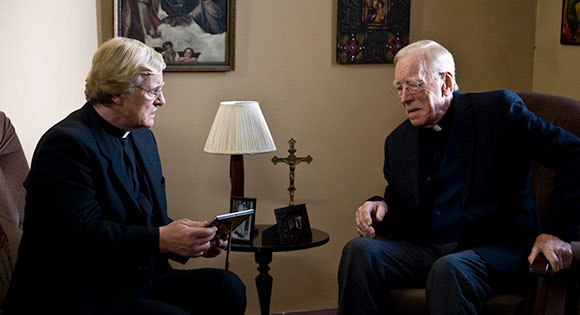
The Vatican priest also visits with Father Celeste van Exem (Max Van Sydow) who served as her spiritual advisor for nearly 50 years. He recounts key moments in her life and also shares the contents of some letters in which she described her despair and feelings of separation from God.
"The greatest suffering is being lonely, feeling unloved, having no one. I have come more and more to realize that it is being unwanted that is the worst disease that any human being can ever experience."
— Mother Teresa
We first see this nun (Juliet Stevenson), who was born in Albania, when she is the popular principal and teacher in the Sisters of Loretto's Calcutta school for girls in India. She has a fine rapport with her students but is deeply troubled by the poverty and suffering of the poor on the streets just outside the convent's walls. The Mother General (Mahabanoo Mody-Kotwal) of the convent reminds her that as a cloistered nun, she is not to go outside to give them food or comfort.
Then on a train going to a retreat, Teresa hears the voice of God tell her to serve the poor. Once again, the Mother General objects, but Teresa insists that she be allowed to send a request to the Vatican. She is very pleased when the Pope gives her a one-year release from the convent to follow her "calling within a calling." She moves into the slums.
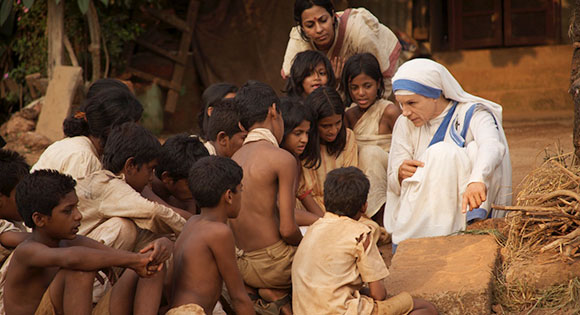
With equanimity, she handles the fears of the poor Hindus living there that she is disguising her true goal, which is to covert the people to Christianity. She insists she is just there to do what they need. She begins teaching the children and after some training, provides medical care. With patience, she waits for the Vatican's continued permission for her work. When it looks like she may be forced to return to the convent, she petitions the Vatican to be able to start a new order – the Missionaries of Charity.
"Through humility we grow in love, Humility is the beginning of sanctity."
— Mother Teresa
Juliet Stevenson gives a sensitive and solid performance which admirably conveys both the high and the low points in Mother Teresa's work with the poor and then with those dying on the streets of Calcutta. We witness her vulnerability when she throws up after seeing and smelling a sick man with festering sores all over his body. We believe that she truly cares for the children, even when their parents doubt her.
"God doesn't ask that we succeed in everything, but that we are faithful. However beautiful our work is, let us not become attached to it. Always be prepared to give it up, without losing your peace."
— Mother Teresa
The actress catches the joy in Mother Teresa's soul when a government official gives her an abandoned Hindu temple to turn into a hospice so that she can provide loving care to the dying. Stevenson's body language also reveals the disappointment when the Yugoslavian government refuses passage to India for her mother and sister to see her for the first time in many years.
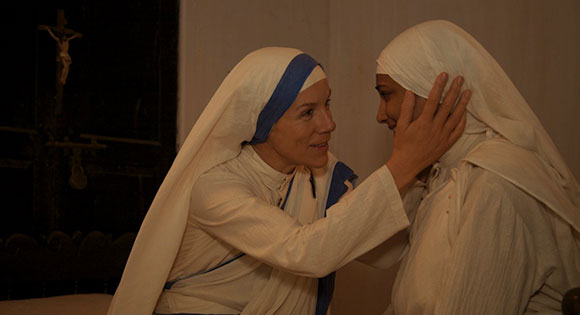
Perhaps most impressive about this portrait of Mother Teresa is that we never see any inkling of the despair she described in her letters. We see her steadfastly doing her work, mentoring many young women who join her fledging order, encouraging them in their calling, even when she might have doubted her own. We found ourselves agreeing with Father Praagh's presentation at the Vatican: the letters support his case because, despite her feelings of being abandoned by God, she could and did continue to serve selflessly. Would we do the same?
"We do not need to carry out grand things in order to show a great love for God and for our neighbor. It is the intensity of love we put into our gestures that makes them into something beautiful for God."
— Mother Teresa
Mother Teresa was awarded the Nobel Peace Prize in 1979 and yet in most of her encounters with the media, the most she would say about herself was the oft-repeated phrase: "I am but a pencil in the hands of God." In the end credits, we read that while other Catholic orders are declining in numbers and there is a shortage of parish priests, the Missionaries of Charity now number 4000 and are expanding their operations all over the world.
